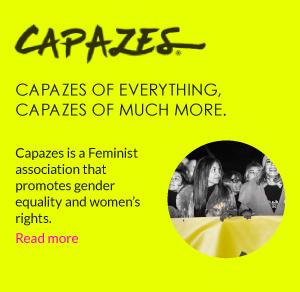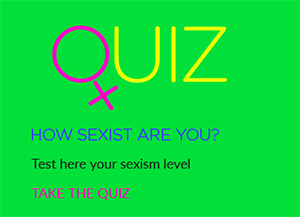How did the partnership, between Capazes and NewsMuseum come to life?
It was an invite from NewsMuseum. NewsMuseum as a mirror of the media and Capazes as a stamp of the struggle for gender equality, give away the same question: Women are invisible in the media. Our aim, besides showing and emphasizing this struggle, is to show how women emancipated themselves and gained more media visibility. Capazes are a project that promotes information and raises awareness among civil society for gender equality and works for the defence of women's rights, so we had to accept this partnership.
What will visitors find in this exhibition that promotes a strong awareness?
Macho Media content follows NewsMuseum’s line, as such is presented on interactive multimedia platforms. Visitors are invited to “emerge” on the presented ideas, they can also count on our curatorship and those ideas develop from moments and milestones that symbolize the struggle for feminine emancipation.
What are those milestones?
The moments of the female body affirmation, social emancipation, educational and work are themes that join together in this chronological journey.
What important media episode of the history of female struggle for emancipation and recognition of their fundamental rights would you point out?
Choosing only one is hard. All of them are important in different areas of the public life. I point out for example, the struggle that existed and still continues for the right to vote, highlighting, in Portugal, the role of Carolina Beatriz Ângelo. It’s a fundamental right and works as a base to the other rights.
“We are in a time in which (and thankfully) genre violence and discrimination don’t go unnoticed”. To what extent is the community effectively aware of these social issues?
The responsibility for the exercise of citizenship and, in this case, feminist citizenship is an exercise that we must all do. Women’s fight for the affirmation of their rights and for gender equality is a very fresh topic because of the several episodes we have witnessed in the media. It is unavoidable that we contact in any way with this vortex of information.
What advice would you give to society?
We need to not only be alert, but also informed and able to decode all the information that we receive about this theme so that we can act upon it.
“After all, how sexist are we?”
The exposition explains how sexist each of us is, in a kind of psychological test. There is still a lot to do, though we are moving in the right direction.
In your opinion, what kind of measures is most urgently needed to reverse the numbers of gender inequality and discrimination against women, also in salaries, in Portugal?
I read that Portugal is the EU country where the wage inequality between men and women has increased with the crisis. It's all said! Measures need to be taken in short, medium and long term. Women accumulate by their nature several steady and permanent roles in their daily lives. Being a woman and a mother cannot mean work incapacity. The labour market and corporate and institutional bodies have to be adapted to current needs.




